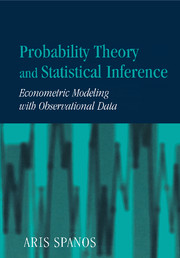Book contents
- Frontmatter
- Contents
- Preface
- Acknowledgments
- Symbols
- Acronyms
- 1 An introduction to empirical modeling
- 2 Probability theory: a modeling framework
- 3 The notion of a probability model
- 4 The notion of a random sample
- 5 Probabilistic concepts and real data
- 6 The notion of a non-random sample
- 7 Regression and related notions
- 8 Stochastic processes
- 9 Limit theorems
- 10 From probability theory to statistical inference*
- 11 An introduction to statistical inference
- 12 Estimation I: Properties of estimators
- 13 Estimation II: Methods of estimation
- 14 Hypothesis testing
- 15 Misspecification testing
- References
- Index
4 - The notion of a random sample
Published online by Cambridge University Press: 06 July 2010
- Frontmatter
- Contents
- Preface
- Acknowledgments
- Symbols
- Acronyms
- 1 An introduction to empirical modeling
- 2 Probability theory: a modeling framework
- 3 The notion of a probability model
- 4 The notion of a random sample
- 5 Probabilistic concepts and real data
- 6 The notion of a non-random sample
- 7 Regression and related notions
- 8 Stochastic processes
- 9 Limit theorems
- 10 From probability theory to statistical inference*
- 11 An introduction to statistical inference
- 12 Estimation I: Properties of estimators
- 13 Estimation II: Methods of estimation
- 14 Hypothesis testing
- 15 Misspecification testing
- References
- Index
Summary
Introduction
Primary aim of this chapter
The primary objective of this chapter is to complete the metamorphosis of the simple statistical space to a simple statistical model which began in the previous chapter. In chapter 3 we converted the first component, the probability space, into a probability model. In this chapter we proceed to convert the second component, the sampling space, into a sampling model. The metamorphosis involves two of the most important notions of probability theory: Independence and Identical Distribution. Upon completion of the metamorphosis we reach one of our primary intermediate targets, the formulation of a simple statistical model, which constitutes the simplest form of a statistical model. The latter provides the cornerstone on which we will build both empirical modeling as well as statistical inference. As mentioned in chapter 1 what differentiates empirical modeling from other forms of modeling is the use of observed data in conjunction with statistical models. It will be very difficult to exaggerate the importance of the notion of a statistical model in the context of modeling with non-experimental data. This is because choosing a statistical model when modeling non-experimental data is the most difficult aspect of the problem and thus one needs a thorough and in depth understanding of the concepts involved. This understanding concerns both the probabilistic (mathematical) aspects, as well as the intuitive dimension as it relates to the observed data.
- Type
- Chapter
- Information
- Probability Theory and Statistical InferenceEconometric Modeling with Observational Data, pp. 145 - 189Publisher: Cambridge University PressPrint publication year: 1999



